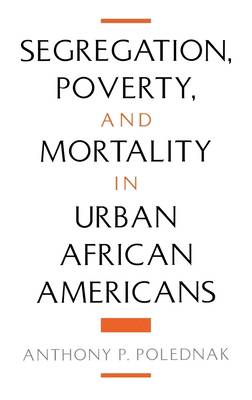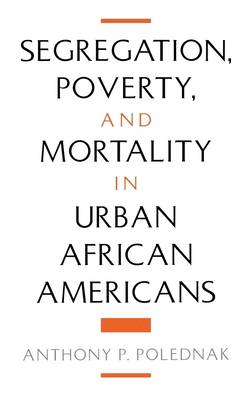
En raison d'une grêve chez bpost, votre commande pourrait être retardée. Vous avez besoin d’un livre rapidement ? Nos magasins vous accueillent à bras ouverts !
- Retrait gratuit dans votre magasin Club
- 7.000.000 titres dans notre catalogue
- Payer en toute sécurité
- Toujours un magasin près de chez vous
En raison de la grêve chez bpost, votre commande pourrait être retardée. Vous avez besoin d’un livre rapidement ? Nos magasins vous accueillent à bras ouverts !
- Retrait gratuit dans votre magasin Club
- 7.000.0000 titres dans notre catalogue
- Payer en toute sécurité
- Toujours un magasin près de chez vous
Segregation, Poverty, and Mortality in Urban African Americans
Anthony P Polednak
Livre relié | Anglais
114,45 €
+ 228 points
Description
The potential impact of segregation on the health of African-Americans is an intriguing and controversial topic that draws from the areas of epidemiology and the social sciences. Epidemiologists have recently turned to the study of racism and health, but epidemiologic studies have not dealt specifically with black-white segregation and health. This book examines mortality rates for African-Americans in selected U.S. urban areas in relation to both social class and the degree of black-white residential segregation. Despite allowances for economic disparity, mortality rates for African-American infants and young adults are shown to be especially high in certain highly-segregated areas--a traditional indicator of low levels of social progress.
Polednak includes previously unpublished analyses of the findings along with data from prior calendar years and the 1990 U.S. census. He uses the statistical method (multiple linear regression) to analyze poverty rates and levels of segregation amongst African-Americans. The author's discussion of social and health issues fits within the framework of Swedish economist Gunnar Myrdal's "American dilemma" thesis that the American creed of egalitarianism, equal opportunity and freedom from discrimination remains unfulfilled. The conclusions are expected to foster interest, on behalf of both epidemiologists and sociologists, in what may be termed the "epidemiology of American apartheid"--a specialized field of research with concrete relevance to social and health policy.
Beside the book's primary audience--epidemiologists and public health practitioners--this volume is intended to appeal to sociologists, especially medical sociologists, who are likely to be familiar with segregation but not with its potential relevance to the health of African-Americans. Psychologists interested in racial discrimination are important potential collaborators with sociologists and epidemiologists in studies of the epidemiology of racial difference in health. Social workers, urban studies experts, and social and health policy-makers will find much relevant material in this book as well. This work fits within the framework of Swedish economist Gunnar Myrdal's thesis that the American creed of equality of opportunity remains unfulfilled.
Polednak includes previously unpublished analyses of the findings along with data from prior calendar years and the 1990 U.S. census. He uses the statistical method (multiple linear regression) to analyze poverty rates and levels of segregation amongst African-Americans. The author's discussion of social and health issues fits within the framework of Swedish economist Gunnar Myrdal's "American dilemma" thesis that the American creed of egalitarianism, equal opportunity and freedom from discrimination remains unfulfilled. The conclusions are expected to foster interest, on behalf of both epidemiologists and sociologists, in what may be termed the "epidemiology of American apartheid"--a specialized field of research with concrete relevance to social and health policy.
Beside the book's primary audience--epidemiologists and public health practitioners--this volume is intended to appeal to sociologists, especially medical sociologists, who are likely to be familiar with segregation but not with its potential relevance to the health of African-Americans. Psychologists interested in racial discrimination are important potential collaborators with sociologists and epidemiologists in studies of the epidemiology of racial difference in health. Social workers, urban studies experts, and social and health policy-makers will find much relevant material in this book as well. This work fits within the framework of Swedish economist Gunnar Myrdal's thesis that the American creed of equality of opportunity remains unfulfilled.
Spécifications
Parties prenantes
- Auteur(s) :
- Editeur:
Contenu
- Nombre de pages :
- 192
- Langue:
- Anglais
Caractéristiques
- EAN:
- 9780195111651
- Date de parution :
- 13-02-97
- Format:
- Livre relié
- Format numérique:
- Genaaid
- Dimensions :
- 156 mm x 241 mm
- Poids :
- 521 g

Les avis
Nous publions uniquement les avis qui respectent les conditions requises. Consultez nos conditions pour les avis.






